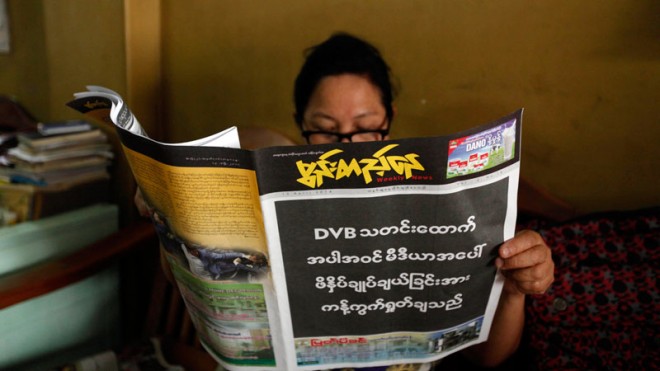
A woman reads a local weekly news journals with its front page printed black with letters saying “By opposing recent arrest and sentencing of journalists including a video journalist of DVB (Democratic Voice of Burma)” Friday, April 11, 2014, in Yangon, Myanmar. (AP)
YANGON, Myanmar — Several private newspapers in Myanmar printed black front pages on Friday to protest the recent arrests and sentencing of journalists, in the latest sign the country’s media climate is worsening.
The black front pages — which included a protest message — in the influential Daily Eleven newspaper, its Sports journal and other papers follow a court decision Monday in which a video journalist for Democratic Voice of Burma was sentenced to one year imprisonment for trespassing and obstructing a civil servant while doing a story on education.
“We are publishing the black front page in protest against the sentencing of the DVB reporter and also to oppose the recent harassment of journalists,” Wai Phyo, chief editor of the Daily Eleven newspaper, told The Associated Press.
Myanmar only recently emerged from a half-century of military rule. One of the most visible reforms since a new, nominally civilian government came to power in 2011 was a freeing up of the press. But media watchdogs say reporters still face intimidation, arrests and criminal charges, and that the media climate appears to be worsening.
In the last four months, at least six journalists and a chief executive of a news journal have been arrested on criminal charges, such as violating the state secrets act or trespassing. Two have been sentenced to jail.
On Monday, Zaw Pe, a 41-year-old video journalist for Democratic Voice of Burma, was sentenced to one year in prison for trespassing and disturbing a civil servant while doing a story on a Japanese-funded scholarship program.
In December, a reporter for the Daily Eleven newspaper, working on a story about corruption, was given a 3-month prison sentence for trespassing, using abusive language and defamation.
In February, four reporters and the chief executive of Unity Journal were arrested and charged under the secrets act for a story about the construction of an alleged chemical weapons factory.
Reporters without Borders on Thursday issued a statement calling for the release Zaw Pe.
“We are not only worried about the impact this sentence could have on freedom of information in Burma but also about what it reveals about the situation in the country,” said Benjamin Ismaïl, the head of the group’s Asia-Pacific desk.
“It is unacceptable that local officials can obstruct a journalist’s work and have him sentenced to imprisonment just because they feel he disturbed them,” he said.
RELATED STORIES
Myanmar ends decades of media censorship
Myanmar media warns of sectarian ‘anarchy’